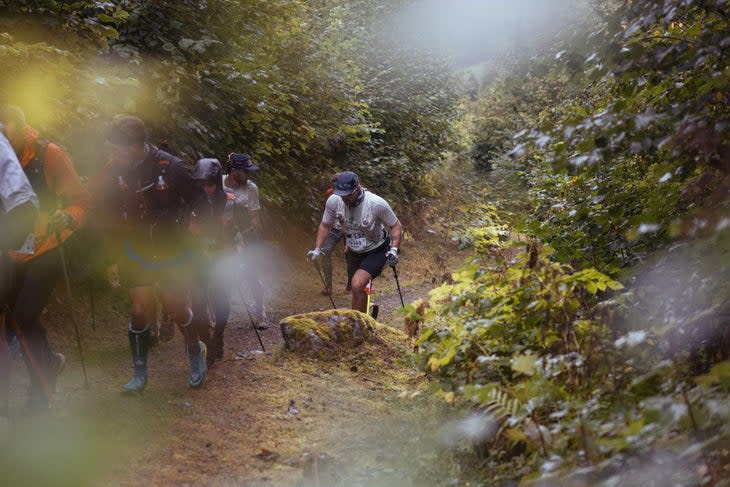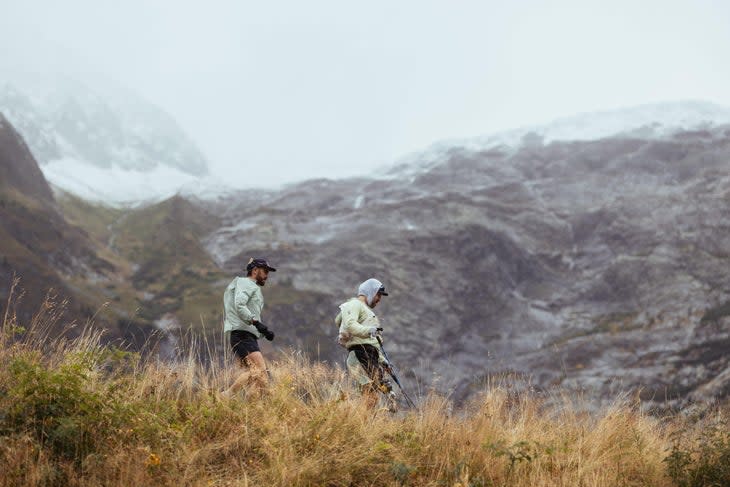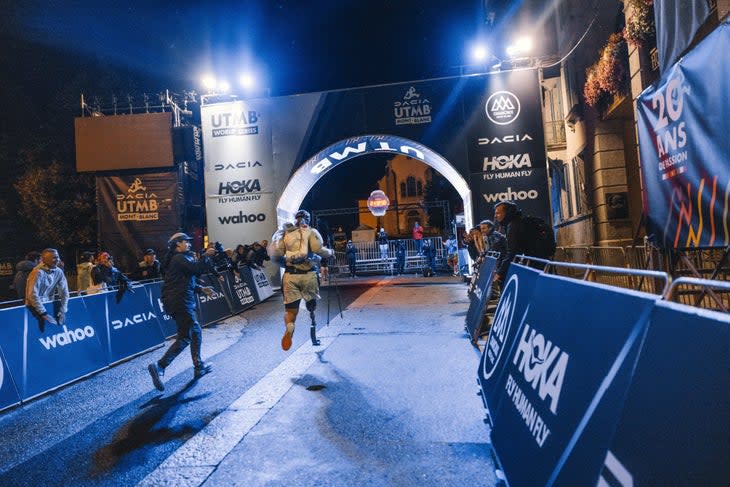Zachary Friedley Launches International Clinic for Adaptive Trail Runners
This article originally appeared on Trail Runner
About the halfway point of the 42K Martigny-Combe to Chamonix (MCC) race, as part of the Ultra-Trail du Mont-Blanc (UTMB) this past August, Zachary Friedley found himself strangely worried about not finishing his dream race, something he trained hard for--and it wasn't because of the mountains.
Friedley was on top of a mountain around 21K (mile 13) in a blizzard, trying to continue the race. A few volunteers informed him that he would not make the next aid station cut-off at Argentiere.
"The weather was insane, with all the rain, snow, and mud on the course," said Friedley, 36, who is known as the Trail Blader. "I was still 10 to 15 minutes under the cutoff time, but there were sweepers behind me, telling me I wouldn't make it to the next cut-off at the Argentiere aid station."
Several people in Friedley's crew attempted to contact race organizers. At the end, he was able to continue running. "I was able to make my way back to Chamonix in 11 hours and 32 minutes, a little over 1.5 hours after the official cut-off time. The race organizers still marked it as a finish, but it was all the more challenging because many volunteers didn't know what to do with me as an adaptive athlete."
RELATED: UTMB-bound Zachary Friedley is Opening the Trails to Adaptive Athletes

Bringing Visibility of Adaptive Athletes to the Trails
Although he only got his first taste of trail running in 2019, Zachary Friedley decided to become a professional runner by the end of 2021.
"I love trail running because of all the beautiful scenery and the possibilities it offers you," said Friedley, a resident of Mendocino, California. He eventually signed a professional contract with On in the spring of 2022, with help of runner advocate Jordan Marie Whestone and race organizer Luis Escobar. "I have only seen people with mobility challenges like me running on trails occasionally on social media. It became a goal of mine to run all over the world, increase our visibility, and welcome more people with movement disabilities onto the trails."
David Kilgore, elite athlete and Global Head of Athlete Strategy and Outdoor at On Running, recognizes the importance of such visibility on the trails. As Friedley's personal pacer at MCC, Kilgore ran the whole race with him with a guide bib.
"Zach has been having an outstanding impact in the trail running community," Kilgore said. "When we walked around in Chamonix [before the race], many people glanced at him, and some came to us and said, 'We can't believe you're doing this.' Everyone who saw Zach on the course was incredibly inspired."
"Zach is a real goal-setter. I never had any real doubt that whatever he puts together, it'll come through," said Meagan Demitz, Friedley's wife. The two of them run the annual trail race Born to Adapt, which invites adaptive runners of all abilities to get out on the trails, through Friedley's nonprofit organization, Mendocino Movement Project.
Unique Challenges
Transfemoral/above-the-knee amputee (via trauma, disease, or congenital defect in Friedley's case) expends 50 to 65 percent more energy in walking than able-bodied athletes, according to a scientific study published on MedScape. "It is generally easier to use a below-the-knee prosthetic leg than an above-the-knee prosthesis," according to this article by Johns Hopkins Medicine.
Differences in surfaces and elevation also make running more challenging. Rain, rocky terrain, and darkness all add to the complexity of running on the trails with a prosthetic blade, especially for an above-the-knee athlete like Friedley, because the prosthetic leg cannot feel the type of terrain and send response signals to the brain.

"I'm very proficient at running uphill and on flat surfaces. I have to be careful with aggressive downhill, which is very hard on my body," Friedley said. "It feels like I'm switching to a downhill gear, a slower one. On average, it takes me three times longer to go downhill than to run on a flat surface. As a result, I'd like to see flexible aid-station cut-off time for adaptive athletes like myself."
Being an above-the-knee athlete also means that Friedley cannot switch on or off his blade, like five-time Paralympian Troy Sachs. Sachs raced the 50K OCC race of UTMB this year, with a guide of his own. He was also able to use one blade for uphill and flat surfaces, and one for downhill. "Seeing other adaptive athletes like Troy Sachs and Lucas Onan at UTMB was so exciting to me, though we have a long way to go," Friedley said.
Advocating for Policy Changes
As a result, Friedley has been advocating for an equitable chance for adaptive athletes to reach the same finish line as able-bodied athletes, including having a guide and flexible aid-station cut-off times.
"At UTMB, we did have a guide bib for David Kilgore, but the communication didn't flow very well from the race organizers to on-the-ground volunteers," Friedley said. This created confusion and frustration when Friedley was navigating a challenging course, rainy weather, and the lack of course marking (removed by volunteers after cut-off time).
On October 25, the UTMB World Series announced its new adaptive athlete policy. Once an athlete verifies their disability status, the race allows for an official guide. "It's one of the items we have been working on together for the past two years," Friedley said. "Now I'm happy to see it as part of their official policy, rather than exceptions for me and for Troy Sachs. That said, we still have a long way to go."
"The responsibility [of communicating this new policy from the organizers to on-the-ground volunteers] shouldn't rest solely on the adaptive athlete running the event," said Demitz. "We'd like to not only see volunteers knowing what to do with adaptive athletes and their guides, but also the idea of adaptive athletes running UTMB normalized and celebrated."
The other change Friedley would like to see is an adaptive athlete-focused index system, different from the elite point system. "My long-term vision is for UTMB, or other trail races, to have a different index, or our own points system," he said. "We might have our own awards, just like the Paralympics."
RELATED: UTMB Has a New Adaptive Athlete Policy. Some Say It’s Lacking.

Rinse and Repeat
After finishing the MCC 42K race and doing some hiking as recovery, Friedley is now focusing on creating a new Born to Adapt New Zealand event a week before the Tarawera Ultramarathon by UTMB in New Zealand in February 2024. The plan is to host an all-inclusive running clinic with Coach Eric Orton on the first day; on day two, Born to Adapt will put on wheelchair accessible 5K and 10K trail races in the Rotorua Redwoods.
"This will be our first international event for Born to Adapt in Rotorua, New Zealand," Friedley said. "The running clinic will be for both people with disabilities and able-bodied athletes. I simply love the people in New Zealand, how inclusive they are, and how the Indigenous culture is just part of their mainstream culture. Earlier this year, I met Matthew Bryson from the Peke Wainga Artificial Limb Service, a specialist healthcare provider that manufactures prosthetics and orthotics. Ever since that meeting, I dreamed of creating a new model of inclusive trail running here because of how vibrant the prosthetics industry is in New Zealand."
Evan Staley, a filmmaker based in Salt Lake City, remarked on Friedley's resolution and ingenuity, after spending three years following Friedley's adventures and efforts of inclusion. "Zach's strength is encouraging people with disabilities to enjoy movement," Staley said. "His Born to Adapt project has welcomed so many people who never thought they could complete a trail race. Zach has this incredible ability to break down walls that stand between large organizations and athletes with disabilities."
Going forward, Friedley hopes his impact goes beyond his presence alone, and into the nitty gritty parts of ultra race policies. "I want to create toolkits for race organizers to be more welcoming and inviting," he said. "I hope that Born to Adapt becomes a model of inclusion so that all people feel welcome in the outdoors."
RELATED: Born to Adapt Trail Races Make Space for Para Athletes
For exclusive access to all of our fitness, gear, adventure, and travel stories, plus discounts on trips, events, and gear, sign up for Outside+ today.

